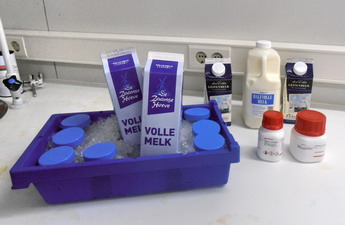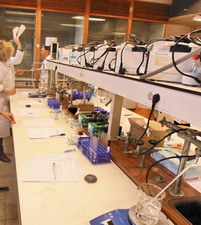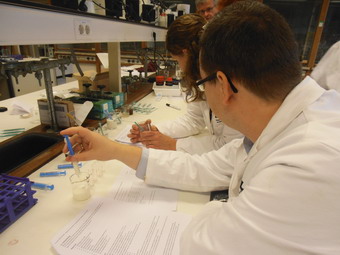One focus of the IRRESISTIBLE-project is inquiry-based science education. This is achieved by developing the teaching modules using an adaptation of Roger Bybee’s 5E-method (the 6E-method). In the engage/explore phase, performing experiments can help the students identify with the subject. In the explain-phase, students can perform experiments to answer their personal research questions.
The Dutch teaching module about Carbohydrates in Breast Milk contains a number of experiments that can be performed at school. With these experiments, student can investigate the levels of carbohydrates, fats and proteins in different types of milk (formula, regular milk, goat milk and even breast milk if available) and use this information to explain why baby’s cannot drink ‘normal’ cow’s milk from the supermarket.
The experiments were obtained from a biology teaching method and adapted for our purpose by two practical teaching assistants from LindeCollege in Wolvega. Teachers in our 2nd CoL asked if we could organize a training session for the experiments at the university, to be better able to adapt the experiments in their school. On November 6, 2015, chemistry and biology teachers and their practical teaching assistants from 5 different schools (13 in total) came to our labs and put on white coats to experiment with milk!
Different types of milk were purchased so there was plenty of variation in the experiments. The teachers experimented with enzymatic digestion of the carbohydrates, fats and proteins in the milk, and tried to make ‘cheese’ with the help of lemon juice out of whole milk or baby formula. Some experiments were a bit more difficult to perform than other, but at the end of the afternoon, most teachers knew how to work with the many tubes, syringes and small beakers of milk.


Left: Different types of milk for the experiments: whole milk, semi-skimmed milk, goat milk and fresh cow’s milk from a farmer’s store. Also baby formula was available. Right: Experimental setup.
The teachers all mentioned the training was very useful to be able to implement the experiments from the module in their school. Teachers that already used the experiments at school indicated that this experience helped the students to put their knowledge about milk into bigger perspective and learned a lot of laboratory techniques.


Left: Experiments in full swing. Right: Studying the manuals.








